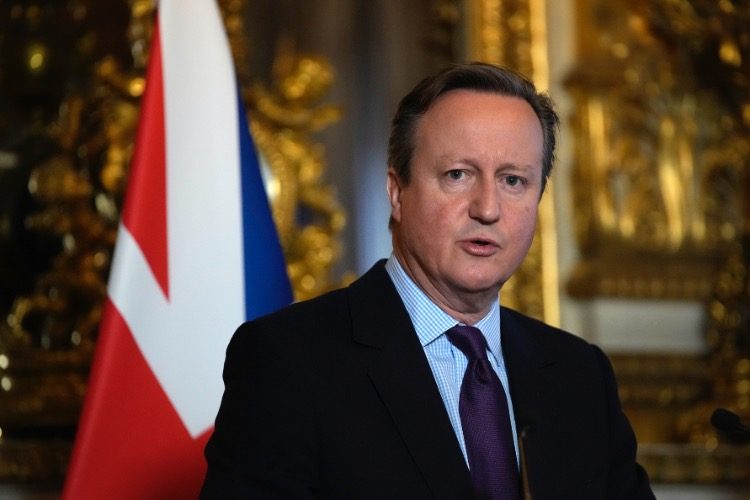
During a reception for Arab diplomats in London on Monday, British Foreign Secretary David Cameron disclosed that the U.K. is mulling whether to officially acknowledge a Palestinian state. Such a move would pave the way toward “irreversible progress” toward peace in the Middle East, he contended.
Furthermore, Cameron urged for a ceasefire in Gaza, the freeing of Israeli hostages held by Hamas, and for the Palestinian people to be granted “a political horizon” toward a two-state solution.
“We have a responsibility there because we should be starting to set out what a Palestinian state would look like; what it would comprise; how it would work,” he declared in remarks cited by various British news outlets.
“As that happens, we, with allies, will look at the issue of recognizing a Palestinian state, including at the United Nations. This could be one of the things that helps to make this process irreversible.”
Recognizing Palestinian statehood would be a historic diplomatic decision for the U.K. The British government declared in 2011 that it would recognize a Palestinian state, but not as a full-fledged member of the UN. Three years later, the House of Commons passed a motion urging the government to declare recognition, but Cameron, who was prime minister at the time, did not do so.
The U.K.’s official position, set out by Britain’s ambassador to the UN General Assembly in November, is that Britain “will work with our partners towards a two-state solution, based on 1967 lines with Jerusalem as a shared capital.”
Notably the phrase “1967 lines” alludes to Israel’s borders as they were prior to the Six-Day War. A return to these lines would see Gaza expand, while Israeli security forces and settlers would depart from the West Bank, Golan Heights, and West Jerusalem.
Opposing Cameron’s notion is Israeli Prime Minister Benjamin Netanyahu, who has long objected to the creation of an independent Palestinian state. “I will not compromise on full Israeli security control over the entire area in the west of Jordan — and this is contrary to a Palestinian state,” he said earlier this month, with “west of Jordan” including both the West Bank and Gaza.
Netanyahu released this statement a day after speaking to U.S. President Joe Biden, who said he had spoken to the Israeli leader about various potential routes to a two-state solution. The U.K. and UN denounced Netanyahu over his refusal to give in, with UN Secretary-General António Guterres decrying “the denial of the right to statehood for the Palestinian people” as “unacceptable.”
Apart from Netanyahu, other Israelis do not think that Israel and an independent Palestine could peacefully co-exist. Based on a Pew Research survey last year, only 35 percent of Israelis “believe that Israel and an independent Palestine can coexist peacefully,” down from 50 percent in 2013.
The Palestinian Authority, which governs the West Bank, backs a two-state deal. Hamas, which governs Gaza, dismisses the idea, instead calling for a nation that extends “from the river to the sea” — a claim covering all of present-day Israel.
Senior Hamas official Khaled Mashaal dismissed calls for the negotiation of a two-state peace deal with Israel to end the war in Gaza, maintaining that the Palestinian people will never legitimize the “Zionist entity” in West Jerusalem by acknowledging its existence.
”We have nothing to do with the two-state solution,” Mashaal said in an interview posted recently by Kuwaiti podcaster Ammar Taqi. “We reject this notion because it means you would get a promise for a state, yet you are required to recognize the legitimacy of the other state, which is the Zionist entity. This is unacceptable.”
The Middle East Media Research Institute supplied an English translation of the interview, in which Mashaal posited that the Hamas attacks on October 7, which sparked the recent war in Gaza, have re-ignited the Palestinian dream of eradicating Israel. He contended that the independent Palestinian nation must stretch from the Jordan River to the Mediterranean Sea and from the Lebanese border to the Gulf of Aqaba.
”I believe that October 7 has enhanced this conviction, has narrowed the disagreements, and has turned the idea of liberating Palestine from the river to the sea into a realistic idea that has already begun,” Mashaal said. “It is not something to be [merely] expected or hoped for. It is part of the plan, part of the agenda, and we are standing on its threshold, Allah willing.”
Mashaal is among various billionaire leaders of Hamas who reside in Qatar. He noted that in wake of the war in Gaza, the slogan “from the river to the sea” has been chanted by pro-Palestinian protestors in major Western cities. He elaborated that Hamas had never planned to merely rule Gaza under Israeli occupation; rather, its governance was vital to build up “the resistance.”
”It provided a political and administrative cover in all means — the weapons, the weapons production, the planning, the training, and the tunnels — while our backs were safe,” Mashaal said.
Israel and Hamas are in the process of reaching a prolonged ceasefire deal within the next two weeks, The New York Times reported on January 27, quoting anonymous U.S. officials familiar with the negotiations.
The agreement could witness Hamas free the remaining Israeli hostages in its custody in exchange for the IDF ceasing its attacks on Gaza for about two months, the paper claimed.
As per the sources, a written draft combining the proposals from both sides has been put together over the past 10 days.
Furthermore, the new ceasefire deal would be “more expansive in scope” than the previous one, the officials divulged to the paper. In its first phase, which would see the hostilities come to a halt for 30 days, women, the elderly, and wounded hostages are to be liberated by Hamas. During this time, the sides will agree to a second phase, which would extend the truce for another month in exchange for the liberation of Israeli soldiers and male civilians.
The agreement would also see more humanitarian aid reach Gaza, the Times added. The number of Palestinians to be freed from Israeli prisons has not yet been negotiated, but the sources portrayed the topic as “a solvable issue.”
Although the arrangement would not grant the permanent ceasefire that Hamas has been demanding, officials voiced their belief that after a two-month break the Israeli attacks on Gaza would be less rigorous. Besides, the truce would enable diplomacy that could facilitate a broader resolution of the Israeli-Palestinian conflict, they said.
Around 1,200 people were killed and some 240 taken hostage during the Hamas incursion into Israel on October 7. The IDF operation, launched in response to the raid, has so far killed 26,422 Palestinians and injured 65,087 others, based on figures released by Gaza’s health ministry. Earlier this week, the International Court of Justice (ICJ) demanded Israel to take all necessary measures to prevent genocide in Gaza.
At the moment, some 139 of 193 UN member states acknowledge the State of Palestine. Israel is recognized by 165.


